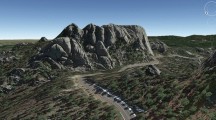Abstract
This paper describes a robust, modular, complete GPU architecture—the Tile-Load-Map (TLM)—designed for the real-time visualization of wide textured terrains created with arbitrary meshes. It extends and completes our previous succinct paper Amara et al. (ISVC 2007, Part 1, Lecture Notes in Computer Science, vol. 4841, pp. 586–597, Springer, Berlin, 2007) by giving further technical and implementation details. It provides new solutions to problems that had been left unresolved, in the context of a joint use of OpenGL and CUDA, optimized on the G80 graphics chip. We explain the crucial components of the shaders, and emphasize the progress we have proposed, while resolving some difficulties. We show that this texturing architecture is well suited to current challenges, and takes into account most of the distinctive aspects of terrain rendering. Finally, we demonstrate how the design of the TLM facilitates the integration of geomatic input-data into procedural selection/rendering tasks on the GPU, and immediate applications to amplification.
Similar content being viewed by others
Explore related subjects
Discover the latest articles, news and stories from top researchers in related subjects.References
AMAP—botAnique et bioinforMatique de l’Architecture des Plantes. http://amap.cirad.fr/
Amara, Y., Meunier, S., Marsault, X.: A GPU framework for the visualization and on-the-fly amplification of real terrains. In: ISVC 2007, Part I. LNCS, vol. 4841, pp. 586–597. Springer, Berlin (2007)
Asirvatham, A., Hoppe, H.: Terrain rendering using GPU-based geometry clipmaps. In: GPUGems2. Addison Wesley, Reading (2005)
Balogh, A.: Real-time visualization of detailed terrain. Thesis of Automatic and Computing, University of Budapest (2003)
Bittner, J., Wonka, P.: Visibility in computer graphics. J. Environ. Plan. (2003)
Blanchet, J.: Modèles Markoviens et extensions pour la classification de données complexes. Ph.D. of Université Joseph-Fourier Grenoble I, France (2007)
Blanchet, J., Forbes, F., Schmid, C.: Markov random fields for recognizing textures modeled by feature vectors. In: International Conference on Applied Stochastic Models and Data Analysis, France (2005)
BlueBerry. http://www.blueberry3d.com
Boulanger, K., Pattanaik, S., Bouatouch, K.: Rendering grass in real time with dynamic light source and shadows. Technical Report no 1809, Irisa, France (2006)
Bruneton, E., Neyret, F.: Real-time rendering and editing of vector-based terrains. Eurographics (2008)
CUDA Programming Guide. http://developer.download.nvidia.com/compute/cuda/1_1/NVIDIA_CUDA_Programming_Guide_1.1.pdf
CUDA Occupancy Calculator. http://developer.download.nvidia.com/compute/cuda/CUDA_Occupancy_calculator.xls
Dachsbacher, C.: Interactive terrain rendering towards realism with procedural models and graphics hardware. Ph.D. of Erlangen University, Germany (2006)
Dachsbacher, C., Vogelgsang, C., Stamminger, M.: Sequential point trees. ACM Trans. Graph. (2003)
Decaudin, P., Neyret, F.: Rendering forest scenes in real-time. In: Eurographics Symposium on Rendering. Norrköping, Sweden (2004)
Decoret, X., Durand, F., Sillion, F.X., Dorsey, J.: Billboard clouds for extreme model simplification. In: Proceedings of the ACM, Siggraph (2003)
Deussen, O., Colditz, C., Stamminger, M., Drettakis, G.: Interactive visualization of complex plant ecosystems. In: Proceedings of the IEEE Visualization Conference (2002)
Deussen, O., Hanrahan, P., Lintermann, B., Mech, R., Pharr, M., Prunsinkiewicz, P.: Realistic modeling and rendering of plant ecosystems. In: Computer Graphics, Siggraph (1998)
Döllner, J., Baumann, K., Hinrichs, K.: Texturing techniques for terrain visualization. In: Proceedings of Visualization ’00, pp. 227–234 (2000)
Eingana: Le premier atlas vivant en 3D et images satellite, Cdrom, EMG (2001)
Fuhrmann, A., Mantler, S., Umlauf, E.: Extreme model simplification for forest rendering. In: Eurographics Workshop on Natural Phenomena (2005)
Gilet, G., Meyer, A., Neyret, F.: Point-based rendering of trees. In: Eurographics Workshop on Natural Phenomena (2005)
Hwa, L.M., Duchaineau, M.A., Joy, K.I.: Real-time optimal adaptation for planetary geometry and texture: 4–8 tile hierarchies. IEEE Trans. Vis. Comput. Graph. 11, 355–368 (2005)
Kraus, M., Ertl, T.: Adaptive texture maps. In: Graphics Hardware (2002)
Lane, B., Prunsinkiewicz, P.: Generating spatial distributions for multilevel models of plant communities. In: Proceedings of Graphics Interface (2002)
Lefebvre, S.: Modèles d’Habillage de Surface pour la Synthèse d’Images. Thesis of Joseph Fourier University, Gravir/Imag/INRIA, Grenoble, France (2005)
Lefebvre, S., Hoppe, H.: Parallel controllable texture synthesis. In: Microsoft Research, Siggraph (2005)
Lefohn, A.E., Kniss, J., Strzodka, R., Sengupta, S., Owens, J.D.: Glift: generic, efficient, random-access GPU data structures. ACM Trans. Graph (2006)
Lindstrom, P., Pascucci, V.: Terrain simplification simplified: a general framework for view-dependant out-of-core visualization. IEEE Trans. Vis. Comput. Graph. (2002)
Lintermann, D., Deussen, O.: Xfrog. http://www.xfrogdownload.com
Livny, Y., Kogan, Z., El-Sana, J.: Seamless patches for GPU-based terrain rendering. Vis. Comput. 12 (2008)
Meyer, A., Neyret, F.: Textures volumiques interactives. J. Francoph. Inform. Graph. AFIG, 261–270 (1998)
Pajarola, R., Gobbetti, E.: Survey of semi-regular multiresolution models for interactive terrain rendering. Vis. Comput. 23(8), 583–605 (2007)
Premoze, S., Thompson, W.B., Shirley, P.: Geospecific rendering of alpine terrain. Department of Computer Science, University of Utah (1999)
RGD73-74: Régie de Gestion des Données des Deux Savoies. http://www.rgd73-74.fr
Roger, D., Assarson, U., Holzschuch, N.: Efficient stream reduction on the GPU. In: Workshop on General Purpose Processing on Graphics Processing Units, GPGPU (2007)
Schneider, J., Westermann, R.: GPU-friendly high-quality terrain rendering. J. WSCG 14(1–3), 49–56 (2006)
Schneider, J., Boldte, T., Westermann, R.: Real-time editing, synthesis and rendering of infinite landscapes on GPUs. In: 11th Workshop on Vision, Modeling and Visualization (2006)
Seoane, A., Taibo, J., Fernandez, L.: Hardware-independent clipmapping. In: WSCG2007, International Conference in Central Europe on Computer Graphics, Czech Republic (2007)
Smith, A.R.: Plants, fractal and formal languages. In: Proceedings of Siggraph (1984)
Tanner, C., Migdal, J., Jones, M.: The clipmap: a virtual mipmap. In: Proceedings of Siggraph’98, pp. 151–158 (1998)
Trias-Sanz, R., Boldo, D.: A high-reliability, high-resolution method for land cover classification into forest and non-forest. In: 14th Conf. on Image Analysis, Finland (2005)
Wells, D.: Generating enhanced natural environments and terrain for interactive combat simulation (GENETICS). Ph.D. of the MOVES Institute, Naval Postgraduate School, Monterey, CA (2005)
Winzen, J.: Interactive visualization of a planetary system. Student Research Project, Institute for Operating and Dialogue-Systems, Faculty of Computer Science, University of Karlsruhe, Germany (2003)
Author information
Authors and Affiliations
Corresponding author
Electronic Supplementary Material
Below is the link to the electronic supplementary material. (PDF 38kb)
Rights and permissions
About this article
Cite this article
Amara, Y., Marsault, X. A GPU Tile-Load-Map architecture for terrain rendering: theory and applications. Vis Comput 25, 805–824 (2009). https://doi.org/10.1007/s00371-008-0305-1
Received:
Accepted:
Published:
Issue Date:
DOI: https://doi.org/10.1007/s00371-008-0305-1




